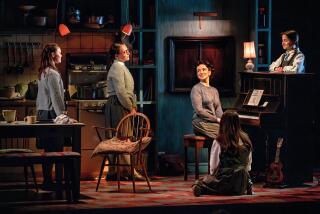MOVIE REVIEW : A Bleak View of the Home Front in ‘The Dressmaker’
- Share via
Wartime, home-front movies, even great ones like “Hope and Glory,” often go a little dewy with sentiment, self-sacrifice and solidarity. But in “The Dressmaker” (Fine Arts), we get a more disturbing view, drained of exhilaration or uplift.
The film--adapted from a Beryl Bainbridge novel, beautifully acted, full of grimness and irony--is set in Liverpool in 1944. In the city outside, the cigarettes and meat are rationed, the British and American soldiers feud and brawl, the streets are full of soot and rain. Inside, something worse is brewing. “The Dressmaker” imprisons the audience in one of those terrible claustrophobic households we get in plays by Harold Pinter or Tennessee Williams: veined with dark secrets, buried hatreds and fears, where propriety battles sexuality and both lose.
It’s a bleak view. But what gives “The Dressmaker” its own exhilaration is the acting: especially the mesmerizingly powerful lead performances by Joan Plowright and Billie Whitelaw. These two great stage actresses make a strikingly opposite pair. Plowright’s face has a mother-hen sternness and glistening eyes. Whitelaw’s is harsh and angular; her eyes like molten, angry flakes of blue.
The seemingly antipathetic sisters they play are engaged in a sort of moral war over their niece, Rita (Jane Horrocks), a sad girl tentatively approaching womanhood, in love with the first man who has noticed her: a carefree, illiterate soldier from Mississippi. Rita’s heart may be broken because she refuses this shallow, opportunistic farm boy the only thing he really wants from her--sex.
Neither aunt is quite what she seems. Good-time Margo (Whitelaw) is a florid extrovert who breaks up her factory line with horrible renditions of old pop songs. Nellie (Plowright), at first, seems the paradigm of the long-suffering, kindly maiden aunt.
Yet, we gradually see that Nellie has evolved into a family tyrant, stern guardian of the Victorian values of her youth, while Margo is steadily growing sillier, louder, a chain-smoking devotee of radio serials and shameless flirtations. Their brother, Rita’s father Jack (Peter Postlethwaite), who lives elsewhere, is a sallow butcher who spouts racist prejudices and all but swoons at the sight of human blood.
The two women seem so morally and physically opposed that it comes as a shock when we discover that they still sleep in the same bed. That moment is the key to the special horror of the film, crystallizing the family’s entrapment, the dark side that begins to steadily reveal itself.
“The Dressmaker” is about the intrusion of sexuality into a household built on a tacit, but finally murderous rejection of all sex. Much of the family’s careful routine is based on lies, hypocrisy, role-playing. Margo inwardly blames Nellie for the death of her World War I soldier-husband and the loss of potential suitors. Nellie views sexuality with fascinated distaste, while, ironically, she earns her living making dresses for local girls to catch their beaux. Rita, caught between them, is simultaneously pulled toward devious sensuality by Margo, and self-flagellating chastity by Nellie.
Playwright John McGrath, who adapted the novel, has created a shrewdly anti-sentimental family portrait. It’s all the more effective, because, for the first half of “The Dressmaker,” you may suspect it will be sentimental: that it’s about long-suffering Nellie’s old-fashioned devotion, the good heart that beats under Margo’s bursting decolletage, and about poor sweet Rita, who will emerge sadder but wiser, yet still cherishing her handsome Yank memories.
No such luck. The film has another side, the kind of horrific cul-de-sac you might find in the sordid family dramas of Balzac, Zola or Celine.
“The Dressmaker’s” director, Jim O’Brien, comes from British TV; he was the co-director of the miniseries made from Paul Scott’s “Jewel in the Crown” quartet. O’Brien doesn’t have a strong, visual style. Nor does he really develop the right ensemble rhythm with this cast. The individual performances--including a brief nasty bit by Margie Clarke of “Letter to Brezhnev”--while excellent, don’t always seem to blend or connect with each other. The movie lacks spontaneity.
Interestingly enough, this doesn’t necessarily hurt the story, which is about alienation and role-playing. What O’Brien has done is choose a trenchant, evocative tale, and then put his talents completely at the service of superb actors.
They respond brilliantly. Few actors’ moments in any other 1988 movie are as charged or memorable as the sight of Horrocks’ Rita burying her mother’s little pearl necklace in the sand, or Plowright’s dressmaker Nellie scurrying around on her punctilious errands, or the look on Whitelaw’s face as she waits in the night air to seduce another, improbable lover.
Whitelaw makes Margo--her face pathetically painted and powdered, voluptuously silly, full of desire and shame--a woman so frustrated and cramped that she’s become besotted with her own dime-novel romances. It’s as if Margo’s most squalid little sins were mad flights of passion, as if the household were a cliff of repression from which she had to hurl herself, while keeping chains of propriety wrapped around her ankles. In “The Dressmaker” (Times-rated: Mature) that’s exactly what they are.
More to Read
Only good movies
Get the Indie Focus newsletter, Mark Olsen's weekly guide to the world of cinema.
You may occasionally receive promotional content from the Los Angeles Times.










